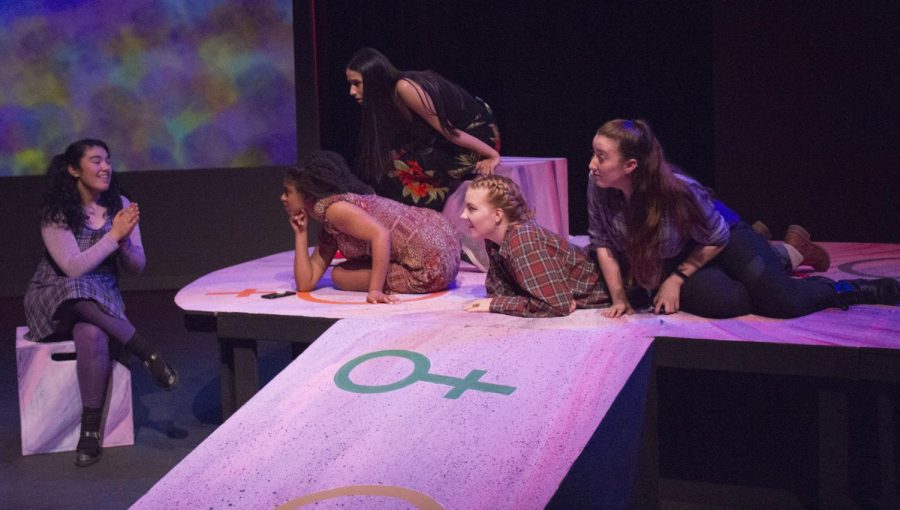Women’s diverse struggles told through ‘stunning’ performances
Jelaine Maestas (left), Kamaria McKinney (middle left), Lissette Maravilla (center), Tayler Meulpolder (middle right) and Irena Miles (right) perform a scene set at a sleepover in “Emotional Creature” directed by Kathryn McCarty in the Knox Center on Friday.
Mar 5, 2018
The emotional intensity and the reality of being a woman in today’s world is highlighted in “Emotional Creature”, the drama department’s first production of the spring semester.
The play is directed by Kathryn McCarty and was written by playwright Eve Ensler. Ensler also wrote “The Vagina Monologues”, another influential and powerfully feminine play that tackles issues faced by women of different ages, races and sexualities.
“Emotional Creature” arrives just in time to celebrate the most important aspect of International Women’s Day: the diversity of women and every challenge they’ve overcome.
The ensemble delivered powerful and gripping performances during each scene.
Each actor depicted multiple characters overcoming the challenges of appearance, sex and self-expression that all girls face. These scenes were also presented with a few musical numbers to lighten the play.
“Emotional Creature” continues on March 9-10 at 7:30 p.m. and March 11 at 3 p.m. in the John and Jean Knox Center for the Performing Arts. Tickets are $15 general admission and $10 for students.
The play was performed mostly in monologues. Lissette Maravilla, starts the show by entering the stage and taking selfies as she struggles to find an angle that makes her appearance acceptable for others.
This opening scene portrays the inner conflict of self-confidence and the opinions of everyone in their lives. Maravilla is also the “popular girl” character in the play. Maravilla’s performance was strong and she embodies the girl everyone emulates despite the irony of having her own insecurities and doubts that hinder her from being herself.
Jelaine Maestas takes on several roles from different areas of the globe. In one scene she’s at a sleepover talking about a sexual experience and the anxiety she felt asking her boyfriend to use a condom. In another scene she plays a 15-year-old girl in China working in a factory producing Barbie dolls. This scene challenges the idea of a “perfect girl” and challenges the audience to acknowledge the contrast between Barbie and her fictional dream life and her maker, a poor young girl working in unsafe conditions.
In another monologue a 16-year-old girl from Iran, played by Nichole Aiwaz, struggles to find the beauty and confidence within her. She found power in her big nose despite familial pressure forcing her to get a surgery reducing its size, which leaves her questioning what beauty really is.
The diversity in cultural backgrounds covered shows how every girl in the world has different, but important struggles. Some struggles are tragic like the 17-year-old girl from the Democratic Republic of Congo, played by Kamaria McKinney. McKinney captivated the audience with her powerful performance portraying an escaped young girl that was kidnapped and raped for years. She offers “rules” for others that may face the same tragedy, based on her experiences. McKinney poured her heart into the monologue leaving a memorable impact on the play.
Another standout piece played by Tayler Meulpolder who embodies the rebel in her characters whether it be dealing with her sexuality or breaking from the mold shaped by her parents to become her real self. The play does a great job of including girls of all sexual orientations.
Irena Miles played a 14-year-old girl from Bulgaria who experienced unbearably horrific violence like so many girls around the world being sold into human trafficking. Miles gave an impressive interpretation of her character with every line she spoke.
Although the few songs by cast didn’t have as much quality as their acting, their stunning acting more than made up for that shortcoming.
The play came to an end with the girls declaring their independence and sexual liberation. One line that highlights this revelation is “my short skirt and everything under it is mine.”
This part personally revived the free and empowered woman I and every girl owned inside her since it goes against everything we were taught by society that has to do with how our bodies should be treated and seen. “Girls Just Wanna Have Fun” closed the show and was the perfect track to accompany one of the last lines spoken by the girls, “This is not extreme, it’s a girl thing.”


